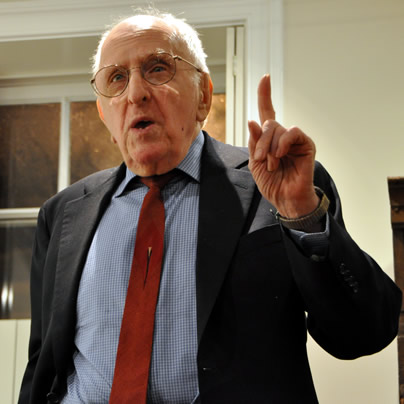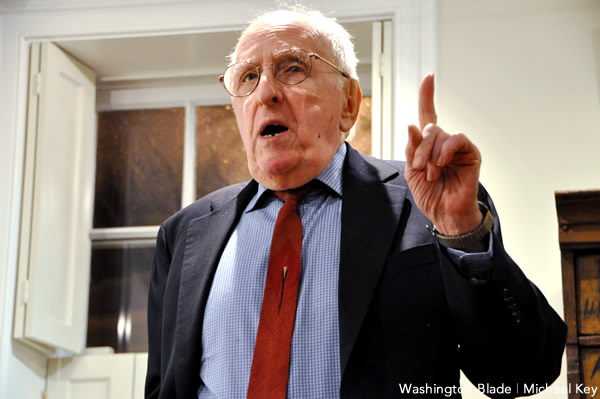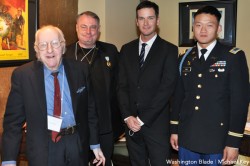Local
An end to Kameny burial stalemate?
‘Tentative agreement’ could clear way for interment of activist’s ashes


Frank Kameny died in October 2011 but his ashes remain in limbo due to a dispute between his estate and a local non-profit. (Washington Blade photo by Michael Key)
An attorney representing the estate of nationally acclaimed gay rights pioneer Frank Kameny said on Wednesday that a “tentative agreement” has been reached to end a dispute that has prevented Kameny’s ashes from being interred at D.C.’s Congressional Cemetery nearly two years after his death.
Christopher Brown, an attorney with the gay-owned law firm Ackerman Brown, said the tentative agreement was reached on July 9 with Helping Our Brothers and Sisters (HOBS), a local LGBT charitable group that bought a plot for the burial of Kameny’s ashes at Congressional Cemetery after soliciting donations from the community to pay for it following Kameny’s death on Oct. 11, 2011.
Brown’s comment came one day after Ackerman Brown’s client, Timothy Clark, Kameny’s longtime friend and heir to his estate, told the Blade that he understood that an agreement between the two parties over the cemetery plot had been reached.
“We reached an agreement on that so I’m going to keep the burial plot,” Clark said in a telephone interview.
“I just have to decide on when I want to have something,” he said in referring to a burial ceremony at the cemetery. “I just don’t know. But I’m open to any suggestions that anybody wants to have because that was Frank’s life. The gay community was Frank’s life. That’s what he fought for.”
HOBS and a group of Kameny’s friends and colleagues in the LGBT rights movement initially scheduled an interment ceremony for Kameny at the cemetery for March 3, 2012. But they abruptly cancelled it after the estate reportedly told the cemetery it would not release Kameny’s ashes until it obtained legal ownership of the burial plot from HOBS.
For more than a year, HOBS and Ackerman Brown have declined to publicly disclose specific details of the nature of the dispute between the two parties over the burial plot other than to say they were negotiating an agreement to enable HOBS to transfer ownership of the plot to the estate.
“[W]e would point out that HOBS has never stood in the way of or delayed the burial of Dr. Kameny’s ashes,” said HOBS President Marvin Carter in an email to the Blade earlier this month. “HOBS has made numerous proposals and overtures to the Kameny estate to have Dr. Kameny’s remains buried at Congressional Cemetery.”
Brown told the Blade in an email on Wednesday that the estate, which is in possession of Kameny’s ashes, also is interested in moving ahead with the burial.
“The estate has always been, and remains willing to work with gay community representatives who knew Frank Kameny in organizing a burial service and appropriate gravesite at which members of the community could pay tribute to Kameny,” Brown said in his email.
In response to a request from the Blade last month, HOBS on Wednesday released information about the money it raised and spent both for Kameny’s personal needs in the last years of his life and for expenses related to Kameny’s funeral and planned burial.
HOBS’s IRS 990 finance reports filed with the IRS for 2010 and 2011 – the most recent such reports publicly available for HOBS – don’t include specific information about money raised for Kameny-related projects.
But the reports show that HOBS’s income increased dramatically in 2010 and 2011 during a period when the non-profit, tax-exempt group and its supporters appealed to the LGBT community for Kameny-related donations — initially to help Kameny pay household expenses and property taxes and later for Kameny’s funeral and burial.
The 990 reports, which all tax-exempt organizations are required to file, show that HOBS’s income was $2,125 in 2008, the first year for which such figures are reported, and $6,544 in 2009. The reports show that in 2010, HOBS’s income rose to $61,480 and in 2011 its income increased to $115,440.
In an op-ed column published in the Blade just before the Thanksgiving holiday in November 2011, Carter discussed efforts by HOBS and other groups and individuals to arrange two separate memorial services for Kameny, one of which was held at the Carnegie Library building in downtown D.C.
“Thus far, with the generosity of many friends, we have covered expenses for Kameny’s viewing at Carnegie Library and his essential funeral costs, too,” which Carter later explained involved paying for Kameny’s cremation and the rental of a casket and the service of a funeral hearse for the viewing ceremony.
“In addition, we have now paid the deposit on a fitting, public gravesite for Kameny at the historic Congressional Cemetery,” he said in the op-ed. “For all who wish to help raise the remaining $4,000 anticipated; you may make your tax-deductible contribution online…or simply mail a check to HOBS…”
The Blade and other local publications also published stories on HOBS’s Kameny-related fundraising activities for the funeral and burial and efforts by HOBS to help Kameny prior to his death.
One effort organized by local gay activist Ben Carver in 2010 was billed as the “Buy Frank a Drink” campaign, which Carver promoted on a Facebook page.
HOBS’s 990 report for 2012, which would include that year’s income, has yet to be released by the charitable watchdog group Guidestar.com, which obtains 990 reports for nearly all U.S. non-profit groups each year from the IRS. HOBS’s 990 report for 2010 was filed in November 2011, and its 2011 report was filed in November 2012. This suggests that its 2012 990 report will likely be filed in November of this year.
The 2011 report shows that HOBS during that year spent $66,413 on “direct support to qualified individuals,” $20,222 on “mentoring programs,” and $11,605 on “educational programs.”
Those three programs, which came to a total of $98,240, accounted for the bulk of HOBS’s expenditures for that year. The 2011 report shows that all other expenses were under $4,000 and were for administrative and overhead expenses such as supplies ($3,727), board meetings ($1,007), Internet ($1,555), meals and entertainment ($505), and telephone ($1,494). More detail on those reported expenses wasn’t available.
Carter discussed HOBS’s mission in an email he sent the Blade on July 24, which also provided information about money HOBS raised and spent on Kameny-related projects.

The late Frank Kameny (left) standing next to Marvin Carter at a HOBS benefit dinner in 2010. (Washington Blade file photo by Michael Key)
HOBS “is an all-volunteer micro-charity that helps marginalized LGBT individuals in our community to meet short-term and often life-sustaining needs,” Carter said. “We focus on helping those who often do not fit the criteria for help from other organizations or agencies – filling gaps in human distress here in Washington, D.C. A sizable portion of our work involves discrimination cases too, many involving torture and asylum,” said Carter, referring to cases noted on the group’s website in which HOBS assists LGBT foreign nationals seeking U.S. political asylum to escape persecution in their home country.
“Before his passing, HOBS assisted Dr. Kameny frequently with some of his essential needs, including transportation for doctor’s appointments, the use of a mobile phone, groceries and meals, urgent bathroom plumbing repairs, repair of his eyewear, and the payment of past property tax bills to prevent his home foreclosure – spending in total thousands of dollars in the years before his death,” Carter said.
Carter provided these figures and related information in connection with the contributions HOBS received and expenditures it incurred for Kameny-related projects in 2010 and 2011:
- Contributions earmarked by donors for Kameny’s burial expenses totaled about $800.
- Other donors “make clear that their donations may be used for HOBS’ general mission,” were silent about how to use the donations.
- During this period, “approximately $15,000 was raised in connection with our general fundraising efforts.”
- HOBS incurred expenses totaling approximately $8,500 related to the purchase of a cemetery plot for Kameny at Congressional Cemetery, cremation expenses and “other expenses of the funeral home (including rental of a casket and hearse for transporting Dr. Kameny’s ashes to the memorial service…and a gravesite marker reading ‘Gay is Good.’”
- There was no surplus of funds from contributions for Kameny’s burial and memorial service efforts. HOBS used money from its general operating account to cover the Kameny funeral and burial expenses not covered by earmarked donations.
- HOBS did not solicit funds for payment of Kameny’s property taxes in 2011. It did raise money for and contributed to Kameny’s property tax payments in 2010.

In an official statement released at the reveal event Capital Pride Alliance described its just announced 2026 Pride theme of “Exist, Resist, Have the Audacity” as a “bold declaration affirming the presence, resilience, and courage of LGBTQ+ people around the world.”
The statement adds, “Grounded in the undeniable truth that our existence is not up for debate, this year’s theme calls on the community to live loudly and proudly, stand firm against injustice and erasure, and embody the collective strength that has always defined the LGBTQ+ community.”
In a reference to the impact of the hostile political climate, the statement says, “In a time when LGBTQ+ rights and history continue to face challenges, especially in our Nation’s Capital, where policy and public discourse shape the future of our country, together, we must ensure that our voices are visible, heard, and unapologetically centered.”
The statement also quotes Capital Pride Alliance CEO and President Ryan Bos’s message at the Reveal event: “This year’s theme is both a declaration and a demand,” Bos said. “Exist, Resist, Have Audacity! reflects the resilience of our community and our responsibility to protect the progress we’ve made. As we look toward our nation’s 250th anniversary, we affirm that LGBTQ+ people have always been and always will be part of the United States’s history, and we will continue shaping its future with strength and resolve,” he concluded.
District of Columbia
Capital Pride board member resigns, alleges failure to address ‘sexual misconduct’
In startling letter, Taylor Chandler says board’s inaction protected ‘sexual predator’

Taylor Lianne Chandler, a member of the Capital Pride Alliance Board of Directors since 2019 who most recently served as the board’s secretary, submitted a letter of resignation on Feb. 24 that alleges the board has failed to address instances of “sexual misconduct” within the Capital Pride organization.
The Washington Blade received a copy of Chandler’s resignation letter one day after she submitted it from an anonymous source. Chandler, who identifies as transgender and intersex, said in an interview that she did not send the letter to the Blade, but she suspected someone associated with Capital Pride, which organizes D.C.’s annual LGBTQ Pride events, “wants it out in the open.”
“It is with a heavy heart, but with absolute clarity, that I submit my resignation from the Capital Pride Alliance Board of Directors effective immediately,” Chandler states in her letter. “I have devoted nearly ten years of my life to this organization,” she wrote, pointing to her initial involvement as a volunteer and later as a producer of events as chair of the organization’s Transgender, Gender Non-Conforming, and Intersex Committee.
“Capital Pride once meant something profound to me – a space of safety, visibility, and community for people who have often been denied all three,” her letter continues. “That is no longer the organization I am part of today.”
“I, along with other board members, brought forward credible concerns regarding sexual misconduct – a pattern of behavior spanning years – to the attention of this board,” Chandler states in the letter. “What followed was not accountability. What followed was retaliation. Rather than addressing the substance of what was reported, officers and fellow board members chose to chastise those of us who came forward.”
The letter adds, “This board has made its priorities clear through its actions: protecting a sexual predator matters more than protecting the people who had the courage to come forward. … I have been targeted, bullied, and made to feel like an outsider for doing what any person of integrity would do – telling the truth.”
In response to a request from the Blade for comment, Anna Jinkerson, who serves as chair of the Capital Pride board, sent the Blade a statement praising Taylor Chandler’s efforts as a Capital Pride volunteer and board member but did not specifically address the issue of alleged sexual misconduct.
“We’re also aware that her resignation letter has been shared with the media and has listed concerns,” Jinkerson said in her statement. “When concerns are brought to CPA, we act quickly and appropriately to address them,” she said.
“As we continue to grow our organization, we’re proactively strengthening the policies and procedures that shape our systems, our infrastructure, and the support we provide to our team and partners,” Jinkerson said in her statement. “We’re doing this because the community’s experience with CPA must always be safe, affirming, empowering, and inclusive,” she added.
In an interview with the Blade, Chandler said she was not the target of the alleged sexual harassment.
She said a Capital Pride investigation identified one individual implicated in a “pattern” of sexual harassment related behavior over a period of time. But she said she was bound by a Non-Disclosure Agreement (NDA) that applies to all board members and she cannot disclose the name of the person implicated in alleged sexual misconduct or those who came forward to complain about it.
“It was one individual, but there was a pattern and a history,” Chandler said, noting that was the extent of what she can disclose.
“And I’ll say this,” she added. “In my opinion, with gay culture sometimes the touchy feely-ness that goes on seems to be like just part of the culture, not necessarily the same as a sexual assault or whatever. But at the same time, if someone does not want those advances and they’re saying no and trying to push you away and trying to avoid you, then it makes it that way regardless of the culture.”
When asked about when the allegations of sexual harassment first surfaced, Chandler said, “In the past year is when the allegation came forward from one individual. But in the course of this all happening, other individuals came forward and talked about instances – several which showed a pattern.”
Chandler’s resignation comes about five months after Capital Pride Alliance announced in a statement released in October 2025 that its then board president, Ashley Smith, resigned from his position on Oct. 18 after Capital Pride became aware of a “claim” regarding Smith. The statement said the group retained an independent firm to investigate the matter, but it released no further details since that time. Smith has declined to comment on the matter.
When asked by the Blade if the Smith resignation could be linked in some way to allegations of sexual misconduct, Chandler said, “I can’t make a comment one way or the other on that.”
Chandler’s resignation and allegations come after Capital Pride Alliance has been credited with playing the lead role in organizing the World Pride celebration hosted by D.C. in which dozens of LGBTQ-related Pride events were held from May through June of 2025.
The letter of resignation also came just days before Capital Pride Alliance’s annual “Reveal” event scheduled for Feb. 26 at the Hamilton Hotel in which the theme for D.C.’s June 2026 LGBTQ Pride events was to be announced along with other Pride plans.
District of Columbia
Capital Stonewall Democrats elect new leaders
LGBTQ political group set to celebrate 50th anniversary

Longtime Democratic Party activists Stevie McCarty and Brad Howard won election last week as president and vice president for administration for the Capital Stonewall Democrats, D.C.’s largest local LGBTQ political organization.
In a Feb. 24 announcement, the group said McCarty and Howard, both of whom are elected DC Advisory Neighborhood Commissioners, ran in a special Capital Stonewall Democrats election to fill the two leadership positions that became vacant when the officers they replaced resigned.
Outgoing President Howard Garrett, who McCarty has replaced, told the Washington Blade he resigned after taking on a new position as chair of the city’s Ward 1 Democratic Committee. The Capital Stonewall Democrats announcement didn’t say who Howard replaced as vice president for administration.
The group’s website shows its other officers include Elizabeth Mitchell as Vice President for Legislative and Political Affairs, and Monica Nemeth as Treasurer. The officer position of secretary is vacant, the website shows.
“As we look toward 2026, the stakes for D.C. and for LGBTQ+ communities have never been clearer,” the group’s statement announcing McCarty and Howard’s election says. “Our 50th anniversary celebration on March 20 and the launch of our D.C. LGBTQ+ Voter’s Guide mark the beginning of a major year for endorsements, organizing, and coalition building,” the statement says.
McCarty said among the organization’s major endeavors will be holding virtual endorsement forums where candidates running for D.C. mayor and the Council will appear and seek the group’s endorsement.
Founded in 1976 as the Gertrude Stein Democratic Club, the organization’s members voted in 2021 to change its name to Capital Stonewall Democrats. McCarty said the 50th anniversary celebration on March 20, in which D.C. Mayor Muriel Bowser and members of the D.C. Council are expected to attend, will be held at the PEPCO Gallery meeting center at 702 8th St., N.W.
















